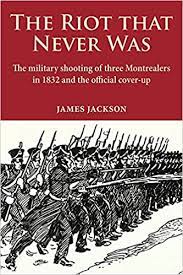 Title Details
Title Details
Title
The riot that never was : the military shooting of three Montrealers in 1832 and the official cover-up
Call No
QWF 971.428 J13r c.2
Authors
Subjects
Languedoc, François, d. 1832. 0000219843
Billet, Pierre, d. 1832. 0000219844
Chauvin, Casimir, d. 1832. 0000219845
QWF Collection.
Authors, Canadian.
Elections--Québec (Province)--Montréal--History--19th century.
Montréal (Québec)--History--19th century.
Montréal (Québec)--English-French relations--History.--19th century.
Québec (Province)--History.--1791-1841.
Billet, Pierre, d. 1832. 0000219844
Chauvin, Casimir, d. 1832. 0000219845
QWF Collection.
Authors, Canadian.
Elections--Québec (Province)--Montréal--History--19th century.
Montréal (Québec)--History--19th century.
Montréal (Québec)--English-French relations--History.--19th century.
Québec (Province)--History.--1791-1841.
Language
English
Published
Montreal : Baraka Books, c2009.
ISBN
9780981240558

Book
|
The riot that never was : the military shooting of three Montrealers in 1832 and the official cover-up
Copies
1 Total copies, 1 Copies are in,
0 Copies are out.









